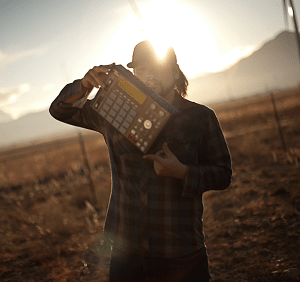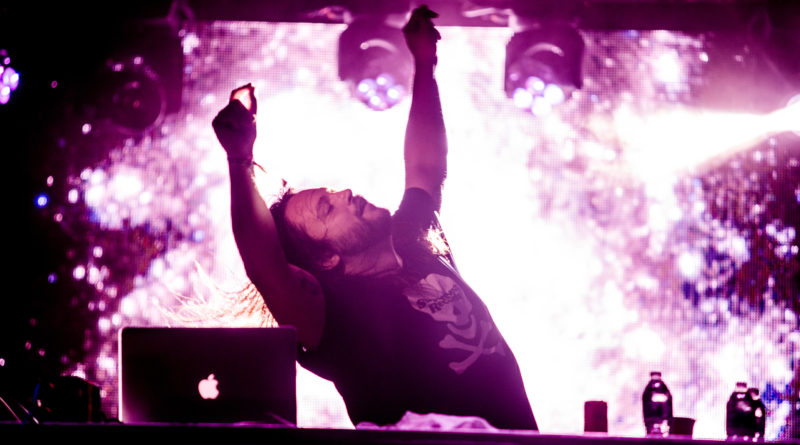Michal Menert On Life, Mickey Hart, & The Pretty Fantastics (B.Getz on L4LM)
Kielce, Poland-born, Loveland, CO-bred Michal Menert is not just a recording musician—he’s also a philosopher-king, culinary artist, beat conductor, and everyman human being. Coming of age in the early aughts as an aspiring underground rapper, Menert caught lightning in a bottle when he co-wrote/co-produced Pretty Lights‘ shape-shifting 2006 album Taking Up Your Precious Time.
A harrowing turn of events in his twenties temporarily derailed the electro-soul producer’s burgeoning career. Yet Menert persevered, and from those trials and tribulations rose a prolific, impassioned phoenix. In the ensuing decade, he has released several instrumental electronic albums, created and overseen Super Best Records, collaborated with a wide swath of bold-font contemporary artists, and written and recorded with his kaleidoscopic big band, Michal Menert & the Pretty Fantastics.
Live For Live Music: Just caught the snippet of your band’s new single “See You Again.” Can you tell us about the writing and recording process, both for this song and the new album, from your band Michal Menert and the Pretty Fantastics?
Michal Menert: The process for this song and this upcoming album has been rooted in working as a group out at my house in Northern California. We started in August with a two-week writing and tracking session with myself, Nick Gerlach, and Matt van den Heuvel. I spent the time between now and then refining the existing material, tracking the rest of the band, and writing lyrics. For the last week, I’ve had a couple members here to help finish some more material for our Fillmore show (in Denver on Friday January 26th.)
L4LM: Riffing on the studio a little bit, how is writing and recording original music with your band different from being a solo electronic artist?
MM: The difference with the band is that things come from other worlds. I have my own universe that I can tap into creatively, but having a band full of gifted creatives who all bring their own universe of experience and talent to a song, that expands the picture. It’s like if you had multiple people painting you their impression of an idea, you’d have a broader scope of what the concept is than if one person shows you an abstract painting of the concept. Every member of this band is incredible at expressing themselves, and they elevate the composition with the elements they bring to it.
[Video: michalmenert]
L4LM: Your name has been buzzed about quite a bit recently, albeit within an entirely different community. Can you talk about your collaboration with Mickey Hart on his new album RAMU? How did that relationship with the Grateful Dead drummer take shape? What are your contributions to the RAMU project? I’m particularly curious about your working with members of Tank and the Bangas and Animal Collective.
MM: Working with Mickey Hart has been incredible and nuts. He is in the studio every day chasing sparks of inspiration through endless tonal cosmos. His drive is inspiring, and his chaotic approach to ideas has taught me a lot. I have to thank Johnathan Singer for making the connection. I’m not entirely sure what the details were, but it was something like this: Mickey wanted someone from the EDM/producer world to help refine his ideas. Johnathan suggested me and shared some Space Jazz and other snippets with Mickey’s management. Then, I got the call that I was coming out to Studio X in Northern California.
I had no idea what I was going to do or what was expected. I had a one-way flight and clandestine information from Mickey’s team, and I ended up showing up while he was taking a quick break. So, I just jumped into the sessions they had pulled up and started refining things until he showed up. We introduced ourselves, I showed him what I had been doing, and he liked it. I stayed a few days, went home, and was invited back a few days later—then again, and again… Two years later, I live out here and love it.

MM: RAMU was a really interesting process. Mickey gave me access to his vault of recordings, and “Decibel” Dave Dennison was cooking and transferring tape at the time, helping me find pieces he thought would aid in my voyage. I got to basically do what I’ve been doing all my life: chop samples and reinterpret existing material into new ideas. And we had this guy Adam Tenenbaum creating amazing patches for Mickey to perform with over the beds I was building from Mickey’s archives.
During RAMU, I was really excited to work with all the talented contributors. We had Zakir Hussain, Niladri Kumar, Avey Tare, Tank, Jason Hann—a slew of others too—coming through and having these marathon, two- or three-day sessions. Animal Collective’s music imprinted upon me a long time ago, so working with Avey Tare was both nerve-racking and a dream come true. Tank is a concentration of interstellar energy I haven’t seen before.

L4LM: Let’s stay in the Dead paradigm and Mickey Hart. I’ve caught a few summertime Dead & Company gigs and very much enjoyed the Drums/Space portion of the proceedings. I was pleasantly surprised to find out that you were involved in that project as well. Please elaborate on your experiences with Dead & Company like the instrumentation, the rig, and what the whole production is like.
MM: As far as Dead & Company, my involvement started with helping create the palette of sounds and backing tracks for Drums>Space out of sessions we were working on. Last year, we started sound designing for him to play new parts over some of the Dead material.
I went out (with Dead & Company) the last two summers to help run Mickey’s elaborate drum fortress and get in cozy with the Dead’s world. His rig is insane—48 channels just for Mickey. Drums and other instruments being processed and augmented in real time. It was cool to see how a machine that size—both Mickey’s rig and the Dead empire—functions under the hood, at least on stage. I learned a lot and have been using what I learned to better present my own vision.
L4LM: That’s fascinating. Worlds colliding! Do you find it easy to jump between the different musical universes, the Grateful Dead and the Colorado electronic music scene? What is that transition like as an artist? As a fan?
MM: The hardest part of the transition is not getting too emotionally attached to work for someone else. On one hand, you’re there because they trust your emotional compass. On the other, you’re there to facilitate another person’s vision, not your own. There were a few stretches I went too deep into the Mickey/Dead world because there was much work to be done. I didn’t nurture my own music so I got depressed and negative. Started seeing my own music as neglected shriveling garbage, started feeling like, “No one even wants me to make any more music” because I was away from the fans, the shows, the un-tethered exploration. Then I would play a show and remember that a few people actually like what I do.
L4LM: Adam Deitch adroitly pointed out that you are “a master of combining the old school hip-hop sampling and beatmaking processes and incorporating modern techniques.” What are you looking for from a sample? What genres or eras do you like to mine for your samples? Who were the producers that inspired you as a youngster, to make beats? How about today–what inspires you conceptually, as a producer?
MM: Let’s start at when I was a youngster in the early 90’s. I loved the Beastie Boys and Snoop Dogg, basically whatever a 10-year-old can find in Colorado on the radio and MTV. I was fascinated by how the music was collaged from a variety of genres and how it was all brought together with a beat.
Teenage me started listening to underground hip-hop and wondering how they did that. Remember this is before you could Google “how do I make a beat” and “become a DJ“. I started with software while everyone I respected was like, “It’s wack if it’s not on an MPC or SP(1200).”
So I was just secretly looping my dad’s music collection over chopped Drum Crazy breaks, trying to emulate cats like Prince Paul, Pete Rock, DJ Shadow, RZA, EL-P. I had no idea what I was doing, but I loved it. All the sudden entire worlds opened up, all of human musical history could be stripped down, reassessed and woven into the future of music.

MM: Finding samples has many faces. Sometimes you want that break or that loop that almost needs nothing to become a monster. Other times you’re looking for an obscure tone in between the loudness of a record, something you can use to paint a shadow under the auditory image and give it depth. When I was younger I wanted easy, “This sh*t is already dope” finds, but as I went down the rabbit hole, I got excited about hearing something odd and off—something no one else might want to touch. So it’s less of choosing genre and more of finding vibe.
There’s a few go-to elements I’ll grab blindly out of the crates: spacey pre-80s look, sexy girl not in the band on the cover in an elaborately staged photo shoot, known favorites on the personnel, weird instruments listed, odd record label I’ve never seen, desperation in the eyes of the musician. These elements yield golden samples 96% of the time.
L4LM: On Twitter, you often talk about relocating to a rural property in Northern California. How has that move changed your life? What do you love about living out in the country? How might that inform your creative process? Do you miss Colorado?
MM: Moving to the Lost Coast saved me. Colorado is great but it’s way too easy to keep the party going. I would come home for three days and end up at shows or parties for two of them because someone was always in town, then go back on the road tired still and with nothing accomplished.
I realized I already work at the party. I don’t need to live there too. The opportunity to live closer to Mickey and to finally have a house by the ocean, and in the Redwoods—it was a dream come true. There’s no fast food, no clubs, no billboards, no litter, no sirens.
You can forget who you really are when no one’s around. If you neglect it for too long, you hate that person when you’re alone with them. You hate it because you know it’s you, but you’ve been wearing this mask to be comfortable around others for so long that you don’t relate to what underneath like you should. The disparity between the social you and the core you makes both sides hypersensitive and critical of each other, and that can tear you apart.

MM: So I found a home where I can choose what influences my day. I can turn the world off and exist in the trees and in sound, and not see another person and think “they’re better than me” or any of the crazy sh*t our brains booby trap us with. I found a safe haven to preserve what’s left of the real me.
I miss my friends, but I still get a healthy dose of Colorado every few months, plus friends come out and visit me here. We have a way healthier and productive experience than we did when I lived in Denver. Not to downplay the importance of having those wild nights and a supportive thriving scene right outside my door. I wouldn’t trade my time in Denver for anything. I just wanted to change perspective, and focus differently.
L4LM: You are a Godfather of the Colorado electronic music scene, a region that has steadily proven to be ahead of it’s time–musically and culturally. Now that it has been over a decade, please share some reflections on what you had such a major role in creating: the art, the scene, and its legacy.

MM: It’s crazy because I don’t see myself as a Godfather. If anything, I’ve been blessed to have a career, to have people understand and relate to what I’m trying to show them. You have to understand that when I was a young indie rapper, people told me I was garbage. When I started touring solo, I was playing instrumental music; kids talked sh*t and told me I was trying to copy Pretty Lights. When I started playing festivals, people told me I gotta make my drums harder because everyone else is, and the kids don’t want moods, they want drops.
Then people started saying to me, “You’re The Godfather of electro soul”, and I felt like I hadn’t earned that. Or maybe it was like being the king of nothing, because I was still broke and I felt like most people hated me. I think I have this complex, because I was always the lonely foreign kid trying to hang out, trying to talk to girls and make friends. So when people are nice to me, in the back of my head it’s like, “They’re really clowning you right now.”
It’s like in high school—no one liked me until I was in the band playing at parties. Then kids who used to wipe boogers on your shirt or push you over into the mud, they start acting like you’re a different person, like those things didn’t happen to you. But in your mind you’re always thinking, “They’re about to turn it around on me, they’re just building up my hopes so it’s funnier.”
But I guess that’s what Denver was to me. Like the headquarters for the Goonies. A place where a bunch of misfits with weird quirks got together and started a party that turned into a huge scene. It’s become a beacon of hope for people who don’t fit into their hometown, for a generation of kids who want to make the pilgrimage to a new promised land.
L4LM: Damn. That is a sobering, introspective look in the rearview mirror. Thank you for that honest rewind, Michal.
Switching gears to your label, Super Best Records. SBR has always been a hub for what’s hot in the streets. You guys boast a tremendous roster including artists with a national profile like Maddy O’Neal and Late Night Radio, personal faves like Willdabeast, and some cats I’ve just gotten hip to, such as Shuj Roswell. Yet things have been pretty quiet on the Super Best Records tip since the aforementioned move to NorCal. Can you let the fans know what’s on the horizon for the SBR squad?
MM: The goal for SBR was always to help each other out. What’s needed now is a conversation about “Where do we go from here?”, because as a label, we don’t generate money. Few labels do these days. So if the best thing the label can do is shine light on up-and-coming artists in our crew, we can do that. I never wanted a structure where an artist is like, “I don’t get what the label can do for me now,” but the truth is, without a large amount of capital to invest freely, most labels can’t do anything beyond tell the world, “These are my friends, and I think you should hear their music.”
So SBR is here to stay, but in the industry’s current climate, new business models are needed. Everyone’s trying to stay afloat. So the goal is to find a way to help others float beyond that initial push. And building with only what you find takes time. For now I’m thankful my friends have been a part of this label and we’re working on ways to bring back things like monthly showcases, tours, etc. to bring the music to more heads and help get these talented artists paid what they deserve.

L4LM: Staying in that lane for a sec, folks in the know were really vibing the Paul Basic collabs. Will we get another Half-Color release? Or any more material with Break Science? Twilight Frequency might be my favorite release from both of you.
MM: I hope so. I miss Paul. I don’t see him enough, or ever, anymore. He’s one of my favorite people and shares a unique humor that makes hanging out amazing. Lots of collaboration coming out soon, Eliot Lippand I have an EP in the works, I have an EP with Trophy Beats almost done, a dub reggae suite with my friend Benji, and hopefully new material with Break Science.
L4LM: I have always admired the very personal, transparent relationship you share with your fans. And many of us treasure how publicly, you are so hopeful, inspirational, and project as such a positive person. I hear that from lots of your fans that they feel personally connected to you, above and beyond the music, as well as within it. Where does that hope come from, within you? How do you summon that hopefulness in the face of such cultural despair?
MM: I think that the positivity I try to catch and release is based on seeing that my dream got me to that place, where I can have an interaction with a fan. I have fans, and that’s crazy. I have to remind myself that I’ve done things that are good, things that people love.
I’ve been through a lot of weird, dark times—I’ve lost friends, watched my dad die, watched my dream drift out of my grasp, overcome addictions—and I think it’s seeing the other side of those moments where it’s hopeless, yet you go on for some reason. That moment becomes a memory, and you shudder thinking about it, but eventually, you laugh. Because we take it all so seriously and see it’s all so impossible, but when we are the weakest, we end up rising above.
Imagine if we used that same strength when we weren’t at our worst, but at our best. You feel it on stage, that “This is the best me” feeling, sometimes. So I guess, even though I get depressed and sad, I try to focus on the fact that I have time to feel those things—those memories that contrast my current state, memories to make on the other side. And all of it is up to me, to feel how I want to about it in the end. Remind yourself of your good nature, and forgive yourself.
L4LM: Anybody who has been paying attention to you through the years, outside of the music thing, knows you get nice in the kitchen. Word is you could be a professional chef, were you not a musician/producer. What are you stoked about cooking these days? Any specialized dishes du jour from the culinary artistMichal Menert?
MM: I just made Cauliflower Corn Coconut Curry for the first time, and it was pretty good. Needs some tweaks, but it’s a solid vegan meal. I eat everything, but like to do vegan a few days a week to offset the meat. I’m about to film the flagship episode of my cooking show idea, which will be awkward but fun.
L4LM: Thank you so very much, Michal. I gotta tell you, I am honored and grateful, that you not only took the time to speak with me at length today but provided such a thoughtful, genuine and insightful interview. I’d like to appropriately give you the last word, and the remainder of this space to speak directly to your fans, about anything at all.
MM: I just wanted to thank anyone who is invested in my music and my story. It’s been a crazy decade of seeing the world, meeting and working with my heroes and amazing people that have become my best friends. This band, The Pretty Fantastics, is creating something wonderful, something I’ve been striving for since I first started making music with my friends.
We do this independently, so we appreciate when you share and connect our songs with people in your life. That’s how this became anything, to begin with. In the coming months we’re releasing our best work, and I hope you continue to let it into your life and travels, because it’s an honor to be part of your story and soundtrack.

[as told to B.Getz on January 18th, 2018]



